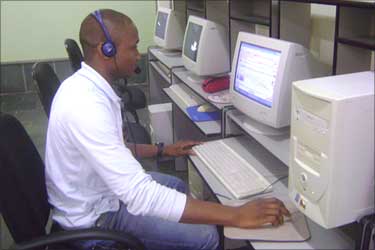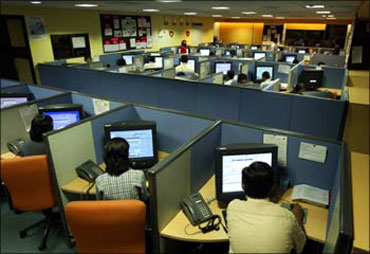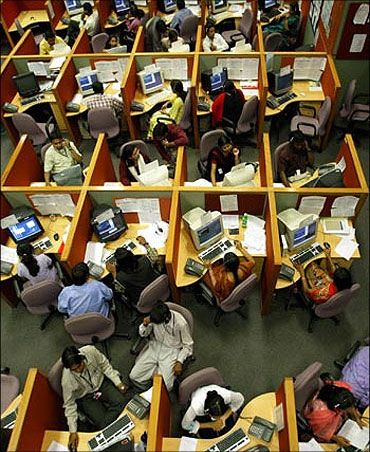 | « Back to article | Print this article |
93% Indian workers feel being in office not a must to be productive
Is the office really necessary? A global study by networking major Cisco reveals 60 per cent of workers believe being in the office is no longer needed to be productive.
Demand to work anywhere, anytime stronger than desire for higher salary; two of three workers expect IT to allow access to corporate information with any device -- personal or company-issued.
Cisco announced on Wednesday the results of an international workplace study that reveals two of three workers around the world believe that they do not need to be in the office anymore to be productive.
In fact, their desire to be mobile and flexible in accessing corporate information is so strong that the same percentage of workers said they would choose jobs that were lower-paying but had leniency in accessing information from outside the office over higher salaried jobs that lacked flexibility.
These and numerous other findings provide real-life insight into the expectations, demands, and behaviour of the global workforce that is influencing the way information is accessed and how business communications are changing.
The study was commissioned by Cisco and conducted by InsightExpress, a third-party market research firm based in the United States.
Click NEXT to know more about the findings. . .
93% Indian workers feel being in office not a must to be productive
Employee desire for mobility, work flexibility very strong
The study involved surveys of 2,600 workers and IT professionals in 13 countries.
It revealed that three of every five employees (60 per cent) believed it was unnecessary to be in the office to be productive. This was especially the case in Asia and Latin America.
More than nine of 10 employees in India (93 per cent) said they did not need to be in the office to be productive. This sentiment was very strong in China (81 per cent) and Brazil (76 per cent) as well.
Two of every three employees surveyed (66 per cent) expect IT to allow them to use any device -- personal or company-issued -- to access corporate networks, applications, and information anywhere at any time, and they expect the types of devices to continue diversifying.
Click NEXT to read further. . .
93% Indian workers feel being in office not a must to be productive
In future, employees expect their choice of network-connected endpoints to broaden to non-traditional work devices like televisions and navigation screens in cars.
For employees who can access corporate networks, applications, and information from outside the office, about half of the respondents (45 per cent) admitted working between two to three extra hours a day, and a quarter were putting in four hours or more.
However, extra hours do not translate to always-on, on-demand employees. They simply want the flexibility to manage their work-life balance throughout their waking hours.
Employees also feel strongly about having the flexibility to work anywhere and that it would dictate their company loyalty (13 per cent), choice of jobs (12 per cent), and morale (9 per cent).
For example, two of three employees worldwide (66 per cent) said they would take a job with less pay and more flexibility in device usage, access to social media, and mobility than a higher-paying job without such flexibility.
This percentage was higher in some countries, such as Spain (78 per cent), despite economic woes during the past couple of years.
Click NEXT to read further. . .
93% Indian workers feel being in office not a must to be productive
Can businesses meet employee needs?
Almost half of the IT respondents (45 per cent) said they are not prepared policy- and technology-wise to support a more borderless, mobile workforce.
Not surprisingly, security is the top concern.
Although many of the IT respondents felt security (57 per cent), budget (34 per cent), and staff expertise (17 per cent) were the biggest barriers to enabling a more distributed workforce, employees often felt IT and corporate policies were the obstacles.
This perception among employees was extremely prevalent in India, where more than half (58 per cent) felt that IT was the obstacle to a more flexible work style.
Click NEXT to read further. . .
93% Indian workers feel being in office not a must to be productive
Education, corporate policies as important as technology
About one in five (19 per cent) employees globally said they have noticed strangers looking at their computer screens in public, while an additional 19 per cent admitted that they never think to check their surroundings.
Nearly one in five (17 per cent) employees admitted leaving devices unattended in public.
Almost three of every five employees globally (58 per cent) admitted that they have allowed non-employees to use their corporate devices unsupervised.
As workforces become more distributed, the potential for data loss increases. One of four IT respondents (26 per cent) said one-fourth of the devices issued to employees in the past 12 months had already been lost or stolen.
Click NEXT to read further. . .
93% Indian workers feel being in office not a must to be productive
As workforces become increasingly mobile, security and risk management concerns inevitably grow.
The findings indicate the real need for better corporate policies, end-user education, and stronger, trusted relationships between employees and IT departments.
How well IT brokers these relationships impacts a company's growth, productivity, competitive advantage, as well as its risk management.
Click NEXT to read further. . .
93% Indian workers feel being in office not a must to be productive
Cisco commissioned the study to maintain its understanding of present-day challenges that companies face as they strive to address employee and business needs amid increasing mobility capabilities, security risks, and technologies that can deliver applications and information more ubiquitously -- from virtualised data centres and cloud computing to traditional wired and wireless networks.
The global study focuses on two surveys -- one centering on employees, the other on IT professionals.
Each survey included 100 respondents from each of the 13 countries, resulting in a survey pool of 2,600 people.
The 13 countries include the United States, Mexico, Brazil, United Kingdom, France, Spain, Germany, Italy, Russia, India, China, Japan, and Australia.






